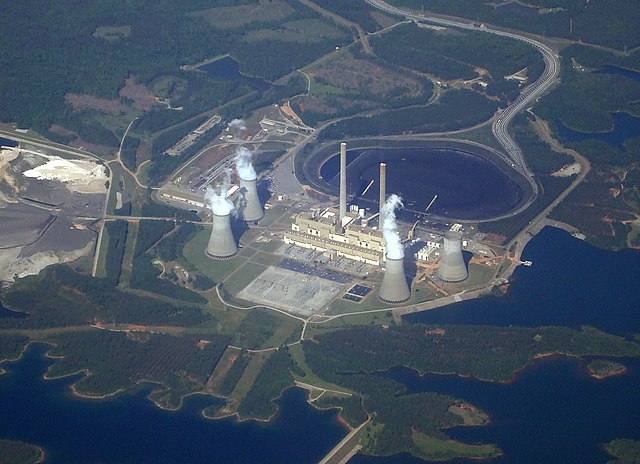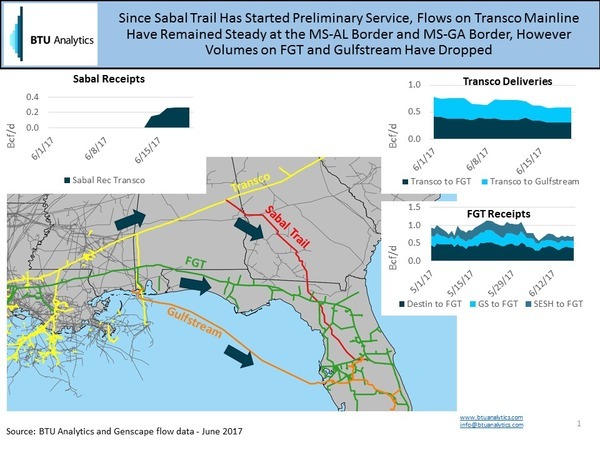Georgia Power (and Florida Power & Light and Jacksonville Electric Authority) created the coal ash; they can find ways to dispose of it safely on their own land. And if FPL is shutting down coal plants, how about shutting down its Unit 4 at Plant Scherer, which sends mercury into our Alapaha River. FPL bought into that unit decades ago with the same excuses it’s using for the Sabal Trail fracked methane pipeline now: shutting down a different generating plant, and alleged (now admitted false) need for more electricity.
The Georgia Power coal ash pond at Plant Scherer, seen here in this undated company photo, will be closed over the next three years. Fabian, Liz – Macon
Special to The [Macon] Telegraph
Kristina Torres, Atlanta Journal-Constitution, More safeguards could be considered for coal ash ponds in Georgia,
Lawmakers concerned about how coal ash is disposed of hinted Tuesday that they may consider more safeguards over how state environmental officials monitor its presence in landfills and ash ponds across Georgia.
Coal ash is a waste product of burning coal that can contain toxic metals such as mercury, lead and arsenic.

Image:
http://www.mercury.utah.gov/atmospheric_transport.htm
Found on: The Mercury Cycle, by University of Wisconsin Eu Claire
One of the four coal-burning units at Plant Scherer is owned by FPL and JEA, the same FPL that gouged Sabal Trail under our Okapilco Creek and Withlacoochee and Suwannee Rivers, and the same JEA that allegedly has sent coal ash to the landfill in Lowndes County, Georgia.
The excuse FPL made for its purchase of part of Plant Scherer Unit 4 27 years ago was to replace nuclear units at Turkey Point near Miami, which were going to be shut down. Tracy Kolody, Orlando Sun Sentinel, 1 August 1990, Fpl Makes Power Play Utility Offers To Buy Georgia Plant,
Florida Power & Light Co. is seeking to buy a rural Georgia power plant as the utility copes with a tight supply of electricity and an upcoming shutdown at the Turkey Point nuclear plant.
Well, they were never shut down and FPL now wants to build more of them. And FPL is using that twin “modernization” needs more electricity excuse for coal plants and Sabal Trail, even though FPL’s Ten Year Plan admits FPL already converted all the coal plants it named to fracked methane before Sabal Trail went in operation and:
“Difference: FPL does not project a significant long-term additional resource need until the years 2024 and 2025.”
In further proof of lack of need, an stock analyst at SeekingAlpha demonstrated that natural gas going to Sabal Trail is reducing by the same amount gas going to FGT and Gulfstream, the other two big pipelines into Florida, for no net addition of gas to Florida.
Meanwhile FPL never talks about shutting down Plant Scherer Unit 4.

Aerial view of the Robert Sherer power plant north of Macon, Georgia,
by Antennas,
Wikimedia Commons, 1 May 2007, Public Domain.
While Georgia Power, the state’s leading energy supplier, is in the process of shutting down all 29 of its coal ash ponds at 11 plants statewide, energy suppliers from outside the state still ship millions of tons of coal ash to Georgia to dispose of it. Many of those out-of-state shipments are going to private landfills, which aren’t subject to the same rules as public ones.
The meeting came as some members of the ad hoc coal ash group of the House Natural Resources and Environment Committee indicated they were especially concerned about how those shipments are transported to Georgia and whether stricter storage requirements are needed for private landfills.
And it was clear some hoped stricter requirements might possibly have a definite effect: inspire companies shipping coal ash here to potentially “take it somewhere else,” said state Rep. Debbie Buckner, D-Junction City.
State law requires coal ash to be stored in lined landfills to prevent seepage into the soil or water table, and officials with the state Environmental Protection Division noted an effort to increase monitoring requirements and give the public more notice and information.
The story links to GA-EPD’s Coal Ash Information web page, which is the one concession GA-EPD made after it helped Georgia Power scuttle the coal ash bills in the last legislative session.
There’s more in the article about “energy providers” say it’s all safe enough in lined landfills, but Sierra Club may sue.
But environmental critics say that Georgia laws still don’t go far enough to ensure that landfills accepting coal ash are sited far from rivers and other water sources, or that they are adequately monitored for seepage into the water table.
Well, WWALS says that, and we’ll keep saying that. WWALS Science Committee Chair Tom Potter and Suwannee Riverkeeper John S. Quarterman said that at a GA-EPD Plant Mitchell public hearing 4 May 2017 in Albany, GA, to assist Flint Riverkeeper.
I said it to Tom Fanning, CEO of Georgia Power’s parent the Southern Company, at the SO stockholder meeting in Pine Mountain, Georgia, 24 May 2017.
And to start with, to congratulate you all on closing coal plants, like Plant Mitchell. I look forward to you closing Plant Scherer so it will stop sending mercury up in the air that comes down in our Alapaha River.
[Some nearby stockholders started clapping.]

Mercury from Plant Scherer in Alapaha River —jsq to FanningYes, you want to clap? Ok, yay.
OK, so, however. We don’t want your coal ash. We don’t want your coal ash in our landfill in Lowndes County, which is a quarter mile uphill from the Withlacoochee River and in an aquifer recharge zone.
And if I can briefly put on my other hat as Suwannee Riverkeeper…
Fanning: [The video doesn’t show, but Fanning nodded; he does his homework.]
…we don’t want your coal ash in any landfill in the Suwannee River Basin. I’m speaking not only for our Georgia members but also for the ones in Florida, we don’t want your coal ash in our landfills or coming down our rivers to the Suwannee and into the Gulf or into the Floridan Aquifer.
Georgia Power and the rest of you made it and it seems you can find a way to store it.
And, um, I would like to recommend that you do; this is question number one; that you do what you did in 2015, which is that after a dozen years of opposition to changing the Georgia law to facilitate solar financing, you guys backed the bill and changed it and started selling solar power.
I recommend that in 2017 you pivot that way about coal, and instead of what you guys did this year of opposing a very mild-mannered set of coal ash bills that basically would have brought greater transparency, I recommend in 2017 that you pivot and support transparency in coal ash and even better bills.
Georgia Power CEO Paul Bowers was there; I spoke to him afterwards.
Georgia Power and Southern Company (and GA-EPD) still have that opportunity to protect the rest of us and our rivers and our Floridan Aquifer from the coal ash Georgia Power made.
Oh, and get on with solar power, stop the failed Big Bet on new nuclear units at Plant Vogtle, which is like a stagecoach line in an electric car world.
For more about coal ash, including the informational meeting in Valdosta last March, the Lowndes County Commission and the Valdosta City Council, see the WWALS coal ash web page.
-jsq, John S. Quarterman, Suwannee RIVERKEEPER®
You can join this fun and work by becoming a WWALS member today!
Short Link:

